Plagiarizing and cheating – how prevalent on campus?
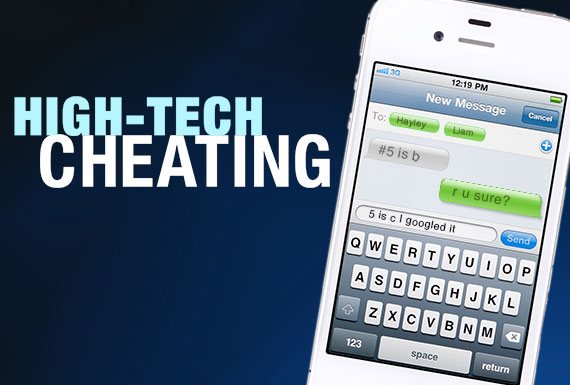
April 20, 2015
Academic integrity and plagiarism have been taken seriously throughout all college and universities around the world.
Technology has granted students the ability to collect an abundance of information from the Internet, becoming one of the most common tools in plagiarism. In recent years, many high-profile cheating scandals have affected colleges and even in many cases, high schools.
Amongst the fallout, a concern regarding academic dishonesty in institutions of higher education throughout the United States have sparked great debate. The International Center of Academic Integrity, a consortiums of learning institutions that holds a yearly assessment, recently found that almost 80% of college students surveyed admitted to cheating at least once.
It happens right here at American International College.
“It’s not like I mean to (cheat), sometimes it’s just easy to read a sentence off the web and write it exactly like I heard it,” said one AIC junior who wishes to remain anonymous.
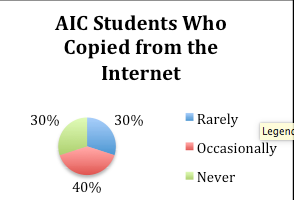
Recent research shows cheating happens.
After surveying approximately fifteen different students here at AIC, among the findings, 90% of those students have admitted to cheating once in their college career.
The policy here at AIC has been strictly enforced, especially over the past few years. In reference to the AIC Undergraduate Academic Regulations handbook, the plagiarism policy is clearly and concisely stated for all students: “Academic Dishonesty, including cheating and plagiarism constitute fraudulent misrepresentation for which no credit can be given and for which appropriate sanctions are warranted.”
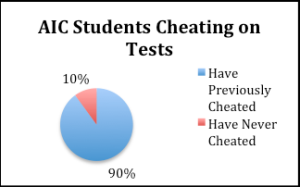
Do students cheat?
Students are becoming frustrated by this act of inappropriate digital citizenship. Students are aware of their peers, and they understand those who plagiarize and surprisingly get away with it.
“I think the most frustrating part of it all, is I’ll be up all night trying to write a paper that due the next day and I see other kids just cut and paste to get their way through the paper, and they get away with it,” said AIC senior Vanessa Ruiz.
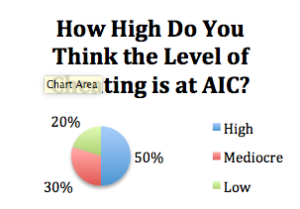
What do others think?
Among the survey taken here at AIC, 40% of students have said they have copied from the Internet, 30% have never copied from the Internet and the remaining 30% have admitted to only occasionally cheating off the Internet.
According to an article, ‘Rethinking Plagiarism in the Digital Age’ from the Journal of Adolescent & Adult Literacy, students tend to see plagiarism as an act of self-preservation rather than an act of dishonesty. “Students are often asked to write in a vacuum,” said Lea Calvert Evering (Rethinking Plagiarism in the Digital Age). “They are writing what they think the teacher or professor wants to hear, their task made more difficult and stressful by the fact that their sole reader knows more about the topic than they do.”
Words and ideas can be stolen in an act of Intellectual Property Theft. According to U.S. law, “the expression of original ideas is considered intellectual property and is protected by copyright laws.”
Educators and professors alike have now become more proactive in their efforts to end plagiarism. Strategic instructions have been developed within universities to educate students on just what plagiarism is and how to avoid it. Daily classroom practices can either induce or reduce plagiarism. In having the ability to gain an understanding of the problem opens the door to new solutions on learning how to avoid it.
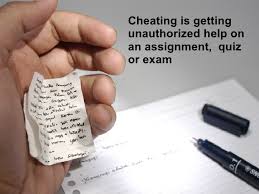 “We want to make sure most students understand the policy, most students on campus don’t. We want to make sure our communication students know what is stated in the policy.” Said Professor Mary Ellen Lowney, chair of the Communications Department at AIC. All Communication students are required to sign a copy of the AIC plagiarism policy, ensuring they understand and have read it.
“We want to make sure most students understand the policy, most students on campus don’t. We want to make sure our communication students know what is stated in the policy.” Said Professor Mary Ellen Lowney, chair of the Communications Department at AIC. All Communication students are required to sign a copy of the AIC plagiarism policy, ensuring they understand and have read it.
Nancy Little, MLIS, Information Literacy Librarian at AIC, has educated students at the university on plagiarism with a power point presentation.
“The consequences of plagiarizing can result in getting fired from your job, stripped of your degree, and kicked out of school. In most college and universities it is the 3 strike policy,” said Little.
As any professor or teacher at an institute of higher education, their job requires the central clause in motivating students to learn and succeed. A student’s inner drive is motivated by external rewards they earn for their learning. These students expect praise, good grades, honors and awards.
In other cases, students who are driven by fundamental motivation lack an understanding of the course material, especially when they don’t have the ability to find the information meaningful or relevant to their lives.
“We want to place an emphasis on not stealing other peoples work,” said Lowney. “We want our students to understand it, because we understand it and we will catch those who plagiarize.”
Today the traditional definition of plagiarism is further challenged by the digital revolution. Websites such as Turnitin.com has been a useful tool educators have used to detect whether or not written assignments have been plagiarized.
“Ever since SNHU got Turnitin, it’s pretty much near impossible for anyone to try and plagiarize or cheat on anything,” said Samantha Blair, a senior at Southern New Hampshire University.
Plagiarism and academic dishonesty will always seem to be an issue. As professors, they value the power of academic writing, as a learning experience to improve writing and research skills.
“As a professor it’s my job to show these students how to cite their sources, and accredit those sources in the right way, avoiding plagiarism,” said Lowney.
The power of discussion has become more of a platform in many Universities, helping students make the connection in understanding the power of plagiarism and how to avoid it. As teachers and academic advisors become more diligent and accepting in their role as mentors, plagiarism can be treated as a tool that makes students more susceptible to criticism and better, more responsible scholars.
All charts, and studies conducted at American International College by Megen Navone were based on a group interview of 15 random students Sophomore-Senior class.


